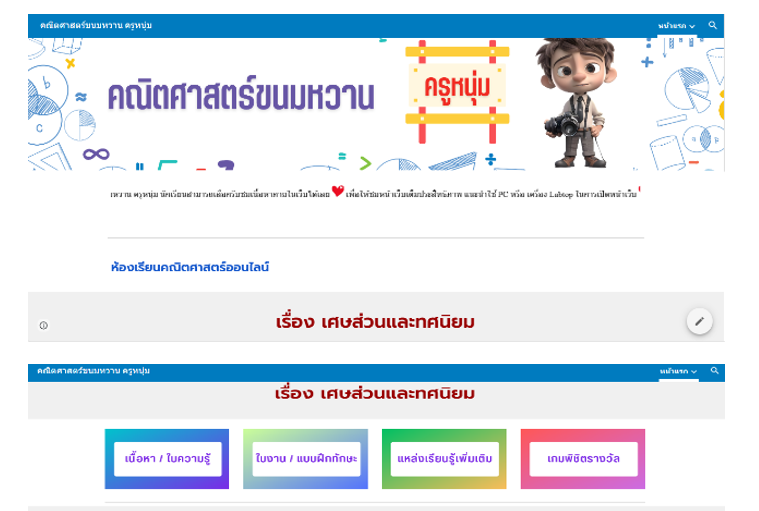Creating and Assessing the Efficiency of Mobile Wireless Device-Based Mathematics Lessons (m-Learning) on Fractions and Decimals Topic for Grade 5 Students
DOI:
https://doi.org/10.14456/jcct.2024.3Keywords:
Mathematical Lessons via Mobile Learning, Attitude towards Mathematics, Fractions, DecimalsAbstract
This research aimed to 1) determine the efficiency of mobile wireless devices in fractions and decimals topic in Mathematics for grade 5 students, 2) find out the efficiency index of lessons through mobile wireless devices in fractions and decimals topic in Mathematics for grade 5 students, and 3) examine the attitude towards mathematics after receiving lessons through mobile wireless devices. The sample group for this research consisted of 32 randomly selected grade 5 students (5/1). The research utilized mobile wireless devices to deliver mathematics lessons on fractions and decimals topic for grade 5 students, including performance assessments and attitude surveys. Data analysis involved means, standard deviations, and percentages. The research findings indicated that 1) the efficiency of mobile wireless devices in fractions and decimals topic in Mathematics for grade 5 students, was 78.17/79.35, demonstrating high efficiency, 2) the efficiency index of mobile wireless devices in fractions and decimals topic in Mathematics for grade 5 students was 0.6865, and 3) the overall attitude towards mobile wireless devices in fractions and decimals topic in Mathematics for grade 5 students was at the highest level (Mean = 4.55, S.D. = 0.51).
Downloads
References
1. ขจรพงศ์ คำดี. นวัตกรรมการจัดการเรียนการสอนด้วยเทคโนโลยีบนอุปกรณ์เคลื่อนที่ผ่านระบบออนไลน์ด้วยแอพพลิเคชั่น. วารสาร มจร. เลย ปริทัศน์. 2564;2(3):35-49.
2. กระทรวงศึกษาธิการ. ตัวชี้วัดและสาระการเรียนรู้แกนกลาง กลุ่มสาระการเรียนรู้คณิตศาสตร์ (ฉบับปรับปรุง พ.ศ. 2560) ตามหลักสูตรแกนกลางการศึกษาขั้นพื้นฐาน พุทธศักราช 2551. กรุงเทพ ฯ : ชุมนุมสหกรณ์การเกษตรแห่งประเทศไทย. 2560.
3. นพดล ผู้มีจรรยา และ อาลดา สุดใจดี. การพัฒนาบทเรียนเอ็มเลิร์นนิงร่วมกับการเรียนรู้แบบปัญหาเป็นฐานรายวิชาเทคโนโลยี (วิทยาการคํานวณ) เรื่อง แนวคิดเชิงคํานวณ สําหรับนักเรียนชั้นมัธยมศึกษาปีที่ 4 โรงเรียนบางลี่วิทยา. วารสารวิชาการ มหาวิทยาลัยราชภัฏกาญจนบุรี. 2564;10(1):33-44.
4. พิสิฐ ตั้งพรประเสริฐ. M-Learning : บทบาทใหม่การเรียนการสอนต้นคริสต์ศตวรรษที่ 21. วารสารศึกษาศาสตร์ มหาวิทยาลัยศิลปากร. 2563;18(1):90-105.
5. รัตนะ บัวสนธ์. วิจัยเชิงคุณภาพทางการศึกษา. กรุงเทพฯ : จุฬาลงกรณ์มหาวิทยาลัย. 2552.
6. ธงชัย แก้วกิริยา. การออกแบบและพัฒนาบทเรียน M-learn รูปแบบ เกมมัลติมีเดียสำหรับ iOS และ Android. 2558;33(1):120-135.
7. พวงรัตน์ ทวีรัตน์. วิธีการวิจัยทางพฤติกรรมศาสตร์และสังคมศาสตร์. (พิมพ์ครั้งที่ 8). กรุงเทพฯ : สำนักงานทดสอบทางการศึกษาและจิตวิทยา มหาวิทยาลัยศรีนครินทรวิโรฒ ประสานมิตร. 2543.
8. ศยามน อินสะอาด. การออกแบบบทเรียน e-Learning เพื่อพัฒนาทักษะการคิดขั้นสูง. กรุงเทพฯ : ซีเอ็ดยูเคชั่น. 2561.
9. มนัสนิต ใจดี, ชนัฎนภา พิทยานุรักษ์, วิมาน ใจดี. ผลการใช้ m-Learning วิชา เทคโนโลยี (วิทยาการคำนวณ) ร่วมกับการเรียนรู้แบบปัญหาเป็นฐานเพื่อพัฒนาผลสัมฤทธิ์ทางการเรียนของนักเรียนชั้นมัธยมศึกษาปีที่ 4 โรงเรียนสงวนหญิง. วารสารศึกษาศาสตร์ มมร. 2565;10(1):308-319.
10. Dewey J. How We Think: A Restatement of the Relation of Reflective Thinking to the Educative Process. Boston : D.C. Heath & Co Publishers. 1993.
11. อุมาพร แก้วทา และ ทศพร แสงสว่าง. การพัฒนาบทเรียนผ่านสมาร์ทโฟนตามแนวคิดองค์กรแห่งการเรียนรู้เรื่อง การพัฒนาเว็บไซต์ สำหรับนักเรียนระดับชั้นประถมศึกษาปีที่ 6. วารสารครุศาสตร์อุตสาหกรรม มหาวิทยาลัยเทคโนโลยีราชมงคลธัญบุรี. 2558;3(2):69-86.
12. พาตีฮะห์ แซนา, ฮานีบะห์ เจ๊ะเล๊าะ, ฟูไดละห์ ดือมอ. การศึกษาผลสัมฤทธิ์ทางการเรียนด้วยแอปพลิเคชัน เรื่อง อัลกอริทึมเบื้องต้น ในรายวิชาวิทยาการคำนวณ สำหรับนักเรียนชั้นมัธยมศึกษาปีที่ 1. ยะลา, คณะวิทยาศาสตร์และเทคโนโลยีการเกษตร มหาวิทยาลัยราชภัฏยะลา: เอกสารสืบเนื่องจากงานประชุมวิชาการระดับชาติด้านวิทยาศาสตร์และเทคโนโลยีเครือข่ายภาคใต้ ครั้งที่ 8 และงานประชุมวิชาการระดับนานาชาติด้านวิทยาศาสตร์และเทคโนโลยีเครือข่ายภาคใต้ ครั้งที่ 1; 2566. หน้า 447-456.
13. พัชชา รวยจินดา และ ดิเรก เอกบวรวงศ์. การเปรียบเทียบเจตคติที่มีต่อการเรียนออนไลน์รูปแบบวิดีโอและถ่ายทอดสดของนักศึกษาแพทย์ปี 4 ศูนย์แพทยศาสตรศึกษาชั้นคลินิก โรงพยาบาลสุราษฎร์ธานี. วารสารอิเล็กทรอนิกส์ทางการศึกษา. 2563;15(2):1-12.

Downloads
Published
How to Cite
Issue
Section
Categories
License
Copyright (c) 2024 Journal of Computer and Creative Technology

This work is licensed under a Creative Commons Attribution-NonCommercial-NoDerivatives 4.0 International License.






























